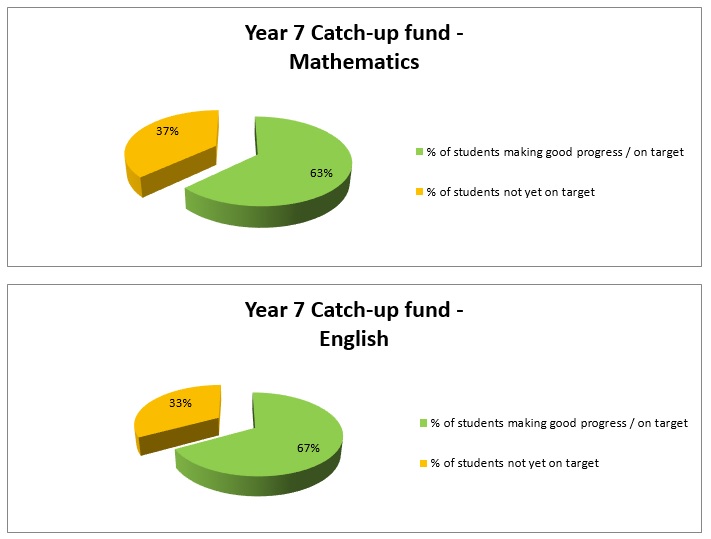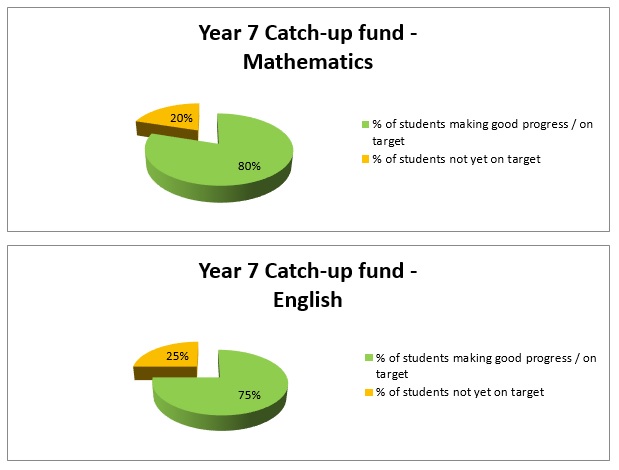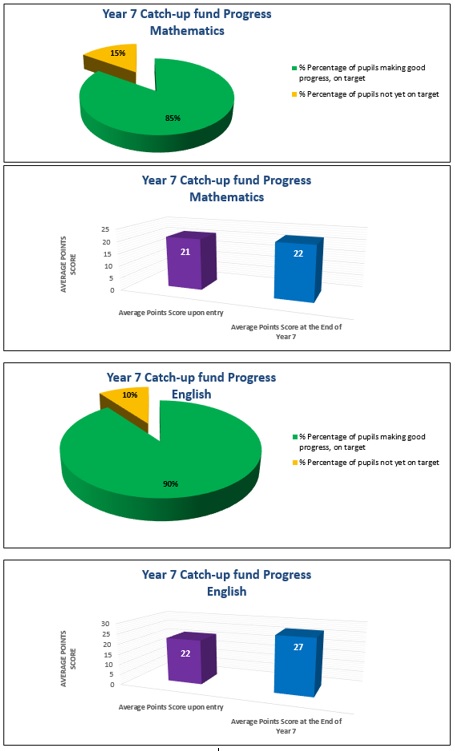Catch Up Premium

Select the relevant section below to find out about catch-up funding.
Summer School Programme - Summer 2021
Summary:
The summer school programme at Stepney All Saints was offered to all students transferring to our school in Year 7 in September 2021. This week-long programme (9th-13th August 2021) was put together with the aim of supporting students who had missed a significant proportion of face-to-face teaching at key stage 2 and, as a result, had missed valuable preparation for secondary education including the transition programmes which normally run in the summer term.
Stepney All Saints specifically encouraged vulnerable children or those with an Education Health and Care Plan (EHCP) to attend the provision.
Our programme involved a blend of academic content, including additional support in English and mathematics, to prepare students for our secondary curriculum as well as enrichment activities including team games, challenges, and sports activities.
Funding Breakdown:
| Equipment and Supplies | £1,629.68 |
| Catering Supplies | £977.40 |
| Staffing Costs | £18,279.19 |
| Overheads | £3167.63 |
| Total | £24,053.90 |
Total government funding received – £16,412.16
Covid-19 Catch-Up Premium Funding
Year 7 Literacy and Numeracy Catch-Up Premium
Year 7 Literacy and Numeracy Catch-Up Premium
What is Year 7 literacy and numeracy catch-up premium?
The Year 7 Catch-Up Premium was originally paid to schools whose Year 7 students had not reached the expected standard in their KS2 Maths and reading assessments. When levels were removed and new assessments introduced, the expected standard was set at a scaled score of 100.
Year 7 catch-up premium 2020-21
After the government’s introduction of the National Funding Formula, the Department for Education has discontinued the Year 7 catch-up premium.
Please follow the link for full details: https://www.gov.uk/guidance/year-7-literacy-and-numeracy-catch-up-premium-guide-for-schools
How are Year 7 students in the 2020-21 cohort being supported?
Twenty students in Year 7 have been identified as requiring additional support in maths and English as they did not achieve the expected standard in Key Stage 2.
As our assessment and intervention strategies were successful last year we have continued to support students in a similar way, making sure we adapt our approaches to individual needs. COVID19 lockdown has impacted some intervention strategies, however the summer term is sued for intensive support as follows:
- The running of the Passport Maths intervention which will be delivered by a specialist LSA.
- Small group reading comprehension lessons taught by a specialist teacher and resources to deliver the intervention.
- Small group spelling lessons taught by a specialist teacher and resources to deliver the intervention.
- Small group numeracy lessons taught by a specialist teacher and resources to deliver the intervention.
- One to one additional numeracy lessons taught by a specialist teacher.
- One to one additional literacy lessons taught by a specialist teacher.
- SEN support for specific students
- Summer workshop sessions
How will impact be measured?
Students who receive intervention are being monitored using the appropriate standardised test before and after the intervention. Students will also be retested using CATs in the summer term and their scores will be compared to their autumn term CATs score. These assessments will be in addition to those formal assessments sat by all students in Year 7.
Year 7 literacy and numeracy catch-up premium - 2019-20
How much catch-up premium allocation does the school expect to receive for 2019-2020?
The Year 7 literacy and numeracy catch up premium funding for the current academic year (September 2019 – August 2020) is expected to be approximately £7000 for 13 eligible students. Tower Hamlets will release the funding in March 2020.
What are the school’s plans for spending the allocation in 2019-2020?
The number of students who will receive extra support in the 2019-20 cohort are as follows:
| Students not meeting the expected standard in reading | Students not meeting the expected standard in maths | Students not meeting the expected standard in reading and maths |
| 26 | 26 | 13 |
As our assessment and intervention strategies were successful last year we plan to spend the funding in a similar way, making sure we adapt our approaches to individual needs. We plan to spend the resources on:
- The running of the Passport Maths intervention which will be delivered by a specialist LSA for 60 minutes after school each week.
- Small group reading comprehension lessons taught by a specialist teacher and resources to deliver the intervention.
- Small group spelling lessons taught by a specialist teacher and resources to deliver the intervention.
- Small group numeracy lessons taught by a specialist teacher and resources to deliver the intervention.
- One to one additional numeracy lessons taught by a specialist teacher.
- One to one additional literacy lessons taught by a specialist teacher.
- SEN support for specific students
- Delivery of the Lexonik teaching programme.
- An LSA dedicated to Year 7 Maths lessons to carry over Catch-Up interventions after school.
- Resources for parents to assist in supporting the target students
How will impact be measured?
Students who receive intervention will be monitored using the appropriate standardised test before and after the intervention. Students will also be retested using CATs in the summer term and their scores will be compared to their autumn term CATs score. These assessments will be in addition to those formal assessments sat by all students in Year 7 throughout the year.
The Year 7 Catch-Up Premium Report (Academic year 2018-19)
How much catch-up premium allocation was received for 2018-2019?
The Year 7 literacy and numeracy catch up premium funding for the academic year (September 2018 – August 2019) was £9,606.
Guidelines and best practice:
Although it is up to schools to decide how best to use the funding, the DfE guidance advises schools to only select programmes and approaches that they know are effective. It suggests that the funding could be used for:
- Individual tuition
- Intensive small-group tuition
- External services and materials
Events or trips that help pupils catch up over a short period of time. All Year 7 students were assessed in Maths, spelling and reading using a range of tests including CATs and standardised assessments. The results of these tests were compared to the Key Stage 2 data received. We identified 18 students who needed additional support in Literacy and/or Numeracy. The premium funded the following interventions and focused on the areas that assessment found to be gaps in the students’ learning.
How we used the Catch-Up Premium in 2018 to 2019
- One to one additional numeracy and literacy lessons taught by a specialist teacher (SpLD) for some students. These lessons used approaches which have been found to be effective (EEF research) such as phonics and metacognitive strategies. These focused on specific areas of numeracy and literacy such as spelling.
- Some students had one to one LSA support.
- Small group reading comprehension lessons taught by a Specialist Teacher for some students.
- Specialist assessment resources to identify barriers to learning.
- Training for teachers for Accelerated Reader + Lexonik.
- Investment in staffing + Year 7 catch up coordinator.
- Intervention with staff and academic tutors.
- Resources e.g. online materials targeted specifically at pupils below the expected standard.
- Investment in staffing to allow smaller sets for lower ability students.
- Breakfast and lunch time sessions.
- All interventions were monitored using a range of assessment methods.
How did the spending make a difference to the attainment of pupils who attracted the premium in 2018-2019?
Year 7 literacy and numeracy catch-up premium - 2017-18
How much catch-up premium allocation was received for 2017-2018?
The Year 7 literacy and numeracy catch up premium funding for the academic year (September 2017 – August 2018) was £9,513.
How was the allocation spent in 2017-18?
The catch up funding was used to target the new Year 7 students who did not achieve the national level in their Key Stage 2 tests in literacy and numeracy, and we intend to use this allocation with:
- Investment in staffing to allow smaller sets for lower ability students.
- Intervention with academic tutors.
- A specialised curriculum targeted specifically at pupils below the expected standard.
- Consultancy support for mathematics to develop the KS3 mathematics curriculum.
- Breakfast and lunch time sessions.
- Individual tuition.
- Targeted resources.
How did the spending make a difference to the attainment of pupils who attracted the premium in 2017-2018?

The Year 7 literacy and numeracy catch up premium funding for the current academic year (September 2018 – August 2019) is expected to be £9606 for 18 eligible students. Tower Hamlets will release the funding in March 2019.
What are the school’s plans for spending the allocation in 2018-2019?
The number of students who will receive extra support are as follows:
| Students not meeting the expected standard in reading | Students not meeting the expected standard in maths | Students not meeting the expected standard in reading and maths |
| 30 | 32 | 18 |
We will prioritise those students arriving below the expected standard in both reading and maths who are in greatest need of intervention.
The following strategies will be employed:
- Work with students requiring support in small groups, one to one in lessons and through withdrawal.
- Investment in staffing to allow smaller sets for lower ability students.
- Targeted support for EAL + SEN pupils.
- Intervention with academic tutors.
- A specialised curriculum targeted specifically at pupils below the expected standard.
- Accelerated reader scheme.
- Support through the science curriculum.
- Use of software/online resources [MyMaths, Doddle Science].
Progress will be reviewed regularly with teams meetings to monitor progress and actions.
Year 7 literacy and numeracy catch-up premium - 2016-17
How much catch-up premium allocation was received for 2016-2017?
The Year 7 literacy and numeracy catch up premium funding for the academic year (September 2016 – August 2017) was £9,793.
How was the allocation spent in 2016-17?
The catch up funding was used to target the new Year 7 students who arrived with level 3 in English or maths, and we intend to use this allocation with:
- Investment in staffing to allow smaller sets for lower ability students.
- Intervention with academic tutors.
- A specialised curriculum targeted specifically at pupils below the expected standard.
- Consultancy support for mathematics to develop the KS3 mathematics curriculum.
How did the spending make a difference to the attainment of pupils who attracted the premium in 2016-2017?
How much catch-up premium allocation does the school expect to receive for 2017-2018?
The Year 7 literacy and numeracy catch up premium funding for the current academic year (September 2017 – August 2018) is expected to be £10,500 for 21 eligible students. Tower Hamlets will release the funding in March 2018.
What are the school’s plans for spending the allocation in 2017-2018?
The number of students who will receive extra support are as follows:
| Students not meeting the expected standard in reading | Students not meeting the expected standard in maths | Students not meeting the expected standard in reading and maths |
| 45 | 28 | 21 |
We will prioritise those students arriving below the expected standard in both reading and maths who are in greatest need of intervention.
The following strategies will be employed:
- Work with students requiring support in small groups, one to one in lessons and through withdrawal.
- Investment in staffing to allow smaller sets for lower ability students.
- Targeted support for EAL + SEN pupils.
- Intervention with academic tutors.
- A specialised curriculum targeted specifically at pupils below the expected standard.
- Accelerated reader scheme.
- “Success Lounge” – English + maths mentoring.
- Support through the science curriculum.
- Use of Software/online resources [MyMaths, Doddle Science].
Progress will be reviewed regularly with teams meetings to monitor progress and actions.


